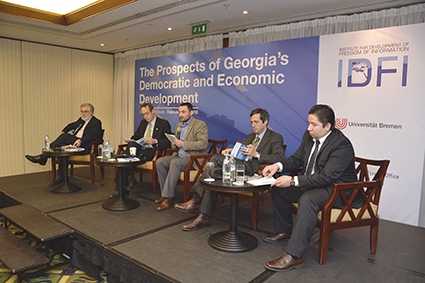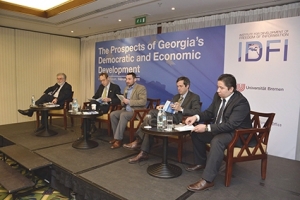Discussing Georgia’s Prospects: IDFI Forum Brings Together Experts and Civil Society
On 1-2 February, the Institute for Development of Freedom of Information (IDFI), in partnership with the University of Bremen and with the financial support of the Federal Foreign Office of Germany, organized an International Forum – ‘The Prospects of Georgia’s Democratic and Economic Development,’ at Tbilisi Courtyard Marriott Hotel. The Forum capped off a massive, two year-long project – ‘Strategic Plan Georgia 2020 – Strengthening Public Involvement (ZigB)’ that studied, analyzed and promoted ‘Georgia 2020,’ a strategic development document that was put forth as a collective vision of the government and civil society.
Prime Minister of Georgia, Giorgi Kvirikashvili opened the Forum, thanking the IDFI, who in recent years has effectively become one of the most influential NGOs in Georgia’s civil society podium, on bringing about more awareness of the document and the tenets of open and good governance in general.
Packed with high ranking officials, the forums opening ceremony was also highlighted with speeches delivered by The Ambassador of the European Union to Georgia, Janos Herman; German Ambassador Extraordinary and Plenipotentiary to Georgia, Bettina Cadenbach; and Director of the IDFI, Giorgi Kldiashvili.
The Forum was divided into two panels that included the following topics:
Georgia’s European and Euro-Atlantic Aspirations
Main areas of EU-Georgia Partnership
Georgia’s Economic Development
Georgia’s Democratic Development
The ranks of speakers were hand-picked and boasted renowned opinion-makers scholars of Georgia from in and outside of the country. The esteemed guests and the general public discussed matters such as the process of Georgia’s integration into the European Union and NATO and the existing challenges in this regard; the Deep and Comprehensive Free Trade Area; perspectives of Georgia’s accession to the Energy Community; Visa Liberalization, and Georgia’s economic and democratic development. Though all equally interesting, the energy community discussion panel proved a particularly engaging affair – no doubt owing partly to the scarcity of such discussions in recent memory and to the much scrutinized so-called ‘Gazprom negotiations.’ It was gratifying to see the experts, the EU commission’s very own Federico Tarantini among them, handling the keen public interest with poise and well-founded, insightful remarks.
The Forum, easily one of the most impressive and well-organized in recent memory, was concluded on February 2 to standing ovation, a fact the IDFI (and should) be undeniably proud about.
Vazha Tavberidze












